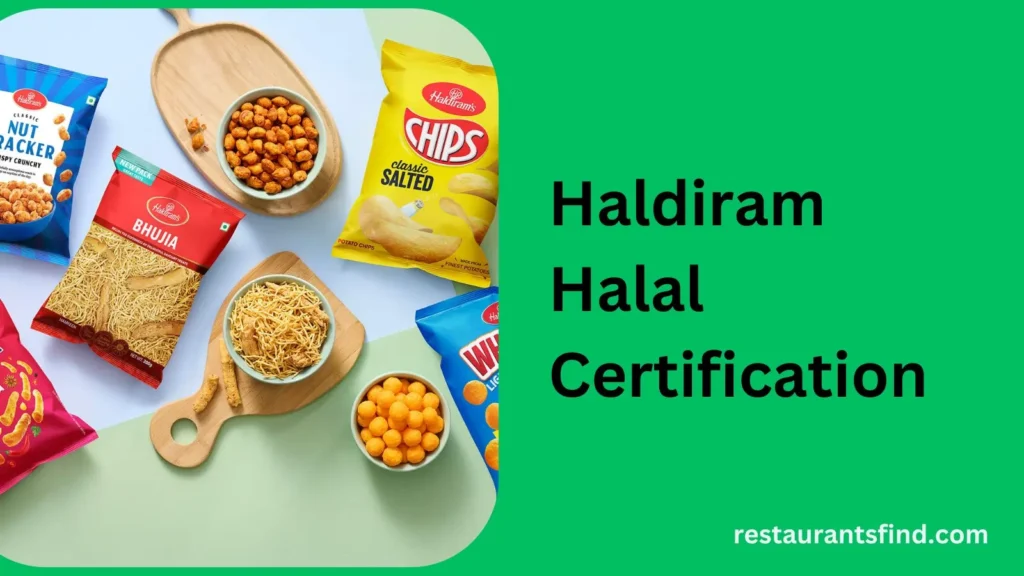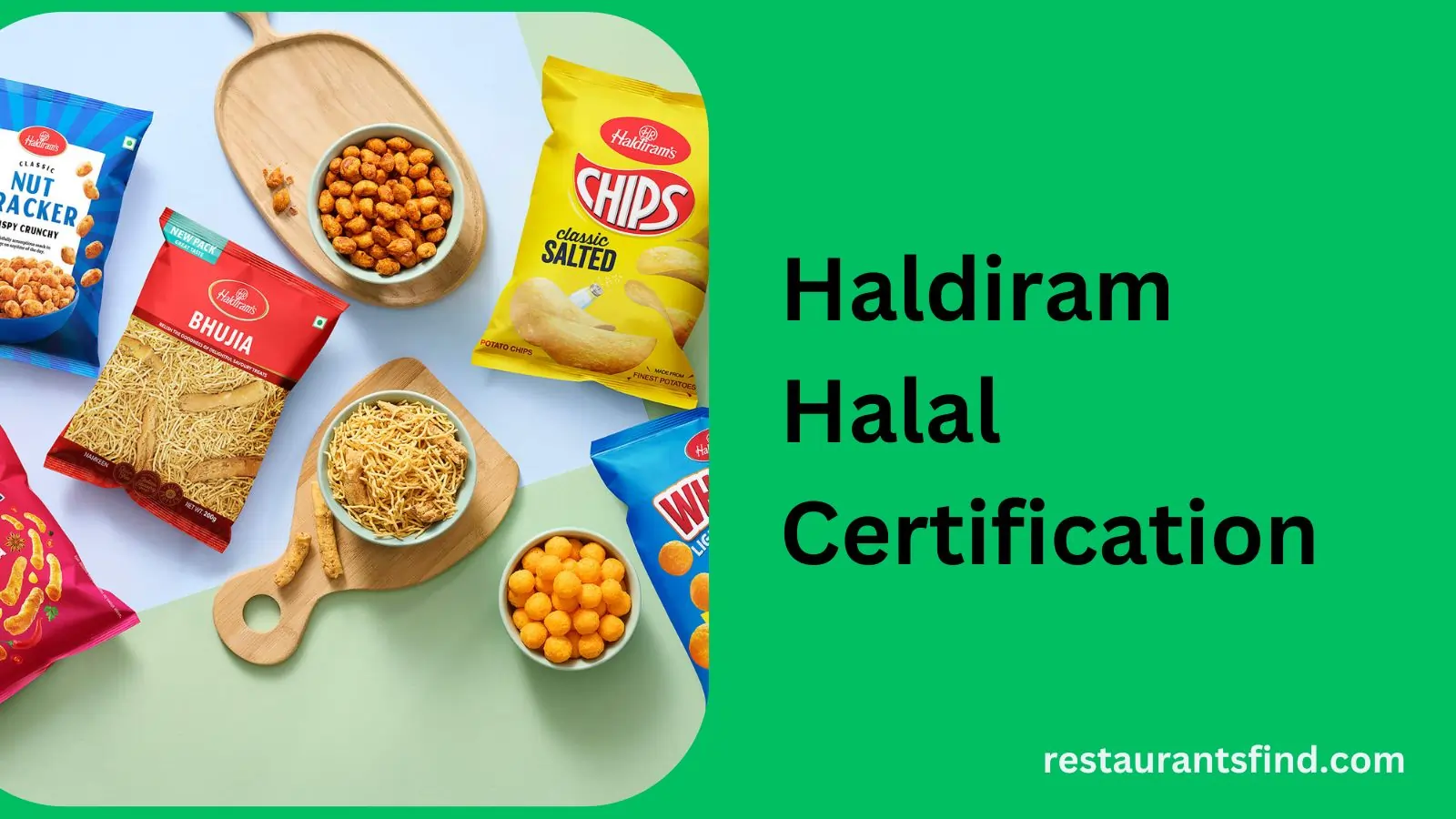Haldiram, founded by Ganga Bhishan Agarwal in 1937, is famous for its Indian snacks and sweets. From its humble beginnings in Bikaner, Rajasthan, it has become a global brand with products like namkeens, sweets, cookies, frozen foods, and beverages. With factories across India and stores in over 80 countries, Haldiram has gained immense popularity.
Despite its success, some Muslim consumers are unsure about whether Haldiram’s products are Halal.

In this blog post, we’ll explain what Halal certification means for Muslims and how they can find out if Haldiram’s products are certified. By understanding Halal certification and checking for it on Haldiram’s products, Muslim consumers can feel confident about their choices.
Haldiram Halal Certification
Haldiram’s is committed to catering to the diverse dietary requirements of its customers, including those who adhere to Halal standards, which are particularly important to Muslim consumers.
The company has obtained Halal certification for its products, ensuring they meet the necessary criteria and standards. While Haldiram’s official website may not openly advertise its Halal certification due to potential backlash, the company has taken steps to ensure compliance behind the scenes.
Haldiram’s carefully sources its ingredients from suppliers with Halal certification, verifying their origin, quality, and purity. Production processes are also designed to align with Halal requirements, guaranteeing that products are prepared, processed, packaged, stored, and transported under Halal principles.
To provide clarity and assurance to consumers, Haldiram’s prominently displays the Halal logo on its product labels. This logo signifies certification by a recognized Halal certifying body. Additionally, the company includes details such as the certifying body, certification number, and expiry date on product labels, offering further transparency to consumers.
Haldiram’s maintains its commitment to quality while adhering to Islamic dietary laws, ensuring that its products remain appealing to both Muslim and non-Muslim consumers alike.
Through this dedication, Haldiram’s continues to offer a wide range of delicious and diverse snack foods and sweets suitable for various dietary preferences.
How Does Haldiram Comply with Halal Standards?
- Use of Halal-certified ingredients: Haldiram ensures that all ingredients used in its products, such as vegetable oils, spices, nuts, fruits, milk, sugar, and flour, are sourced from suppliers that provide Halal-certified ingredients. This involves avoiding ingredients derived from animals, alcohol, or genetically modified organisms (GMOs), as these may not meet Halal standards.
- Segregation of Halal and non-Halal products: Haldiram maintains a strict separation between Halal and non-Halal products throughout the manufacturing process. This includes separate handling, storage, and processing areas for Halal and non-Halal ingredients, as well as separate utensils, machines, and equipment to prevent cross-contamination.
- Adherence to good manufacturing practices (GMP) and hygiene practices (GHP): Haldiram follows industry-standard GMP and GHP protocols to ensure the cleanliness, safety, and hygiene of its manufacturing facilities. This helps prevent contamination and maintains the integrity of Halal products.
- Quality control and assurance: Haldiram conducts regular tests and checks on its products to verify that they meet Halal standards and specifications. This involves rigorous quality control measures throughout the production process, including testing for purity, integrity, and compliance with Halal guidelines. Records of these activities are kept to ensure traceability and accountability.
- Employee training and education: Haldiram provides comprehensive training to its employees on the importance and significance of Halal certification. This includes educating them on Halal rules, regulations, procedures, and policies to ensure full compliance and understanding at every level of the organization.
Overall, Haldiram’s commitment to Halal standards encompasses a holistic approach that covers ingredient sourcing, manufacturing processes, quality control, and employee education to maintain the integrity and authenticity of its Halal-certified products.
Read: Is IRCTC Food Halal? A Comprehensive Guide
Haldiram’s Halal Certification: Celebrating Diversity and Innovation
Haldiram’s Halal certification reflects its diverse range of flavors and innovative approach, showcasing unique ingredients while preserving authenticity.
They use a wide variety of ingredients, reflecting regional tastes and traditions. For instance, they offer Murukkus and Chennai Mixture for fans of South Indian flavors, and Bhelpuri for those who enjoy the tangy snacks of the West.
Haldiram’s also adapts its products to suit changing preferences and lifestyles without compromising quality. They provide ready-to-eat meals like Dal Makhani and Paneer Butter Masala for convenience and nutrition. Additionally, they offer sugar-free sweets such as Rasgulla and Gulab Jamun for health-conscious consumers.
Through Halal certification, Haldiram’s celebrates cultural diversity and fosters inclusivity. Their certified products allow consumers to enjoy a wide array of flavors while respecting dietary beliefs.
They also promote cross-cultural understanding by introducing consumers to different cuisines and cultures.
How Halal Certification Benefits Haldiram’s and its Customers
Haldiram has been a leader in getting and keeping Halal certification for its products. This shows their commitment to quality and keeping customers happy.
They got certified by Halal India in 2008, which is a well-known Halal certifying body in India. They also got certified in other countries like Malaysia, Indonesia, and Singapore so they can sell their products there.
Having Halal certification helps Haldiram’s and its customers in many ways. For Haldiram’s, it boosts their reputation because it shows they care about quality, being genuine, and including everyone.
It also lets them sell their products in more places, like the Middle East, Southeast Asia, and Africa, where Halal products are really popular.
For customers, Halal certification gives them confidence that Haldiram’s products follow Halal rules. It means the ingredients and how they make the food all meet Halal standards.
This is important for people who follow these rules for their diet. Plus, it gives customers more options because they can enjoy Haldiram’s snacks, sweets, and meals without worrying about their dietary beliefs.
Conclusion
Haldiram, a top brand in Indian snacks and sweets globally, ensures its products meet Islamic dietary laws through Halal certification.
This certification guarantees they’re permissible for Muslims. Haldiram’s rigorous process for obtaining and maintaining this certification adheres to all Halal standards.
Benefits include access to Muslim markets, enhanced consumer trust, and global brand reputation.
Haldiram remains committed to maintaining its Halal certification and meeting customer needs while embracing opportunities in the evolving Halal market.

